Book contents
- Frontmatter
- Contents
- List of Tables and Figures
- Acknowledgements
- Foreword
- Introduction
- Part A Changing Perspectives on the Nature and Purposes of Assessment
- Part B Students' Perceptions of Assessment and Feedback
- Part C Reconceptualising Important Facets of Assessment
- 7 Only Connect? Communicating Meaning through Feedback
- 8 Learning from Assessment Events: The Role of Goal Knowledge
- 9 The Learning–Feedback–Assessment Triumvirate: Reconsidering Failure in Pursuit of Social Justice
- Part D Innovations in Assessment Practices
- Notes on the Contributors
- Index
7 - Only Connect? Communicating Meaning through Feedback
from Part C - Reconceptualising Important Facets of Assessment
Published online by Cambridge University Press: 05 August 2016
- Frontmatter
- Contents
- List of Tables and Figures
- Acknowledgements
- Foreword
- Introduction
- Part A Changing Perspectives on the Nature and Purposes of Assessment
- Part B Students' Perceptions of Assessment and Feedback
- Part C Reconceptualising Important Facets of Assessment
- 7 Only Connect? Communicating Meaning through Feedback
- 8 Learning from Assessment Events: The Role of Goal Knowledge
- 9 The Learning–Feedback–Assessment Triumvirate: Reconsidering Failure in Pursuit of Social Justice
- Part D Innovations in Assessment Practices
- Notes on the Contributors
- Index
Summary
Background
A key driver of Dai Hounsell's research, scholarship and teaching has been a concern with communication and audience. This focus is very evident in his academic writing, staff development guides, online teaching and engaging, lively public performances. Across these different genres one can discern a deft tailoring of the forms of writing or speech to the specific purpose and audience. Communication and audience design have also been an analytic focus in his research work. One of his contributions to the field of assessment has been to delineate the forms and functions of different types of writing on assessment and to construct a clear, coherent typology of genres of publications on assessment (Hounsell et al. 2007).
The themes of audience design, perspective-taking and communication have also been central to his research and development work on feedback and guidance on assessment. Over the last decade there has been considerable advocacy to provide more dialogical forms of feedback to students. Here, Dai Hounsell has been well ahead of advances in this field, as this is a cause that he has espoused from his doctoral studies in the early 1980s onwards. In his thesis, for example, he pointed to the need for empathetic perspective-taking on the part of lecturers if appropriate feedback and guidance is to be provided: ‘… a central task of teaching may be to “unthink” one's conception of essay-writing and put oneself in the frame of mind of a student to whom this conception is not simply unfamiliar but also formidably difficult to grasp’ (Hounsell 1984, 355).
From the start of his academic career, he recognised: the inadequacies of any view of communication that, explicitly or implicitly, views it in terms of a direct transmission of meaning; and the complexities involved in achieving common reference. He observed that the evidence of his thesis work revealed that ‘it is misleading to assume that a common pool of meanings exists. Indeed, as we noted, a recognition by tutors of the problem of intersubjectivity would seem to be a prerequisite to genuine communication about expectations’ (Hounsell 1984, 355).
- Type
- Chapter
- Information
- Advances and Innovations in University Assessment and Feedback , pp. 131 - 151Publisher: Edinburgh University PressPrint publication year: 2014



